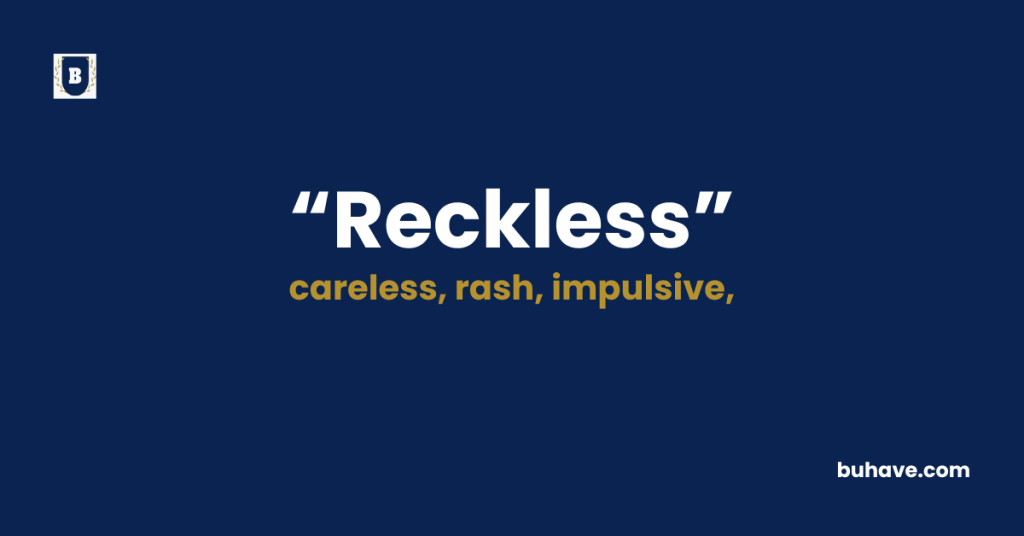The word Reckless (Adjective) refers to acting without thinking about the consequences, often in a way that is risky or dangerous. In this guide, you’ll learn the full definition, synonyms, antonyms, etymology, and real-life examples of how to use Reckless correctly in sentences.
Reckless Explained in Depth
A complete and detailed guide to the word Reckless including meaning, definition, examples, etymology, synonyms, and antonyms.
Meanings of Reckless
Reckless means showing a complete disregard for danger, caution, or consequences. It often describes behavior that is bold but irresponsible or hazardous.
Definition
Reckless describes actions taken without thinking through the possible negative outcomes. A reckless person may act on impulse, ignore rules, or disregard safety. For example, someone who drives at high speeds through a crowded area is being reckless. In relationships, recklessness can take the form of saying hurtful things without considering the impact. The term is commonly used to describe actions that are bold but lacking in judgment or responsibility. It is not always about physical risk—sometimes, it refers to emotional or financial choices. Although the word can suggest confidence or boldness, its use is mostly negative, pointing to carelessness that puts oneself or others at risk. It highlights the absence of thoughtful decision-making and often leads to avoidable problems or harm.
Etymology
The word “reckless” comes from the Old English word receleas, where rece means “care” or “attention” and -leas means “without.” Thus, “reckless” originally meant “without care.” Over time, the term evolved to mean acting in a way that ignores potential danger or consequence. By the 14th century, it was used in English literature to criticize careless or daring behavior. The word shares roots with “reckon,” which means to think or consider. So, being reckless literally means acting without thought or calculation. It has been a popular descriptor in legal, literary, and everyday contexts for centuries, especially when referring to dangerous or foolish actions. Today, “reckless” is often used in legal situations to describe behavior that is so careless it becomes punishable, such as “reckless driving” or “reckless endangerment.”
Example Sentences
- He made a reckless decision to invest all his savings in a risky startup.
- Reckless driving caused the accident on the highway.
- Her reckless words damaged her reputation at work.
Reckless Synonyms
- Careless
- Rash
- Impulsive
- Thoughtless
- Irresponsible
- Foolhardy
- Daring
- Brash
- Wild
- Unthinking
Reckless Antonyms
- Careful
- Cautious
- Prudent
- Thoughtful
- Responsible
- Deliberate
- Mindful
- Wise
- Level-headed
- Measured
FAQs about Reckless
Here’s a FAQ-style guide about the word “Reckless”
1. What does “reckless” mean?
It means acting without care or thought for the consequences, often in a dangerous or irresponsible way.
2. Is recklessness the same as bravery?
No. Bravery involves courage with awareness of danger, while recklessness ignores consequences entirely.
3. Can someone be unintentionally reckless?
Yes. People can act recklessly without realizing the full risk involved in their actions.
4. Is “reckless” always negative?
Generally, yes. It typically suggests harmful or dangerous behavior, not just boldness.
5. Can recklessness have legal consequences?
Yes. Actions like reckless driving or endangerment can result in fines, legal charges, or imprisonment.

















